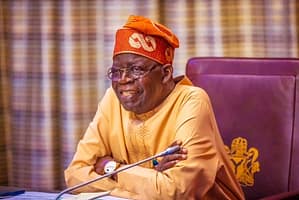Tinubu Outlines his govt’s Plans for Nigerian Universities

President Bola Tinubu has said the Nigerian government would soon reconstitute the governing boards of federal universities as part of plans to reinvigorate them.
The president said the new boards would be charged with prioritising the implementation of various visitation panel reports in the universities.
Mr Tinubu, represented by the Minister of Special Duties and Intergovernmental Affairs, Zaphaniah Jisalo, spoke on Saturday at the 27th Convocation Ceremony of the University of Abuja.
He, however, assured the university-based unions that any agreements and memoranda signed between them and the government henceforth would be implemented.
He added that the government would do its best to fund education through appropriation and special interventions.
He said: “The situation has been exacerbated by the harsh realities of recent global and national economic down-turns, complicated by the COVID-19 pandemic. Therefore, the time has come for all stakeholders in the education sector, including the students, staff, unions, parents and guardians, the public and private sectors, to coalesce around the consensus that education is the responsibility of all and sundry.”
Appointments in universities
Mr Tinubu also condemned the politics of having individuals indigenous to the communities where the universities are sited to hold principal offices, a situation that has led to disruption in some Nigerian universities in the past.
Last year, indigenes of Ile-Ife protested for days after the university council announced the appointment of Adebayo Bamire, a professor, as the university’s vice-chancellor.
The protesters insisted that another contestant and an Ife indigene, Rufus Adedoyin, a professor of Physiotherapy, should be appointed instead.
“By the autonomy status granted through the Universities Miscellaneous Act, there are clear guidelines on the appointment of principal officers of universities. Yet, some universities disregard or abuse the freedom that the unions fought, strenuously for decades to achieve,” Mr Tinubu said.
“Without mincing words, the government has not been impressed by the inelegant deployment of undue politics of exclusion, primordial considerations, etc., in the process of selection and appointment of vice-chancellors and other principal officers as well as the manner of appointing staff into leadership positions,” he added.
On strike
The president acknowledged the legitimacy of industrial actions but noted that incessant strikes in Nigerian public universities have crippled the sector.
He said his administration would ensure that the universities are not subjected to unnecessary closures in the future.
READ ALSO: Why universities are increasing fees – Ministry of Education
“Indeed, the humongous cost of unending industrial actions on the nation’s overall well-being is unquantifiable. That is why the government is deeply appreciative of all those who have contributed to the resolution of the last prolonged industrial action in the nation’s public universities,” he said.
“We also commend the staff unions for their display of patriotism and sacrifice by calling off the strikes. The resolution of the crisis proved eloquently, that no challenge is insurmountable when all are motivated by a shared vision, commitment and unity of purpose.”
Convocation
Speaking earlier, the Vice-Chancellor of the University of Abuja, Abdul-Rasheed Na’Allah, a professor, said the university produced 7,034 graduates this year.
“Out of this number, 6,044 will be graduating with first degrees, 270 with postgraduate diplomas, 613 with Master’s, and 107 with doctorate degrees,” he said.
He said there are 39 first-class students among first-degree graduates.
He added that 1,581 graduated with second-class upper division; 3,702 with second-class lower division; 573 with third class, and 149 with pass.
“It is equally important to note that among the students graduating today are 87 of the first set of the University of Abuja Business School with a Master’s in Business Administration (MBA) degree,” Mr Na’Allah said.








Leave a Reply